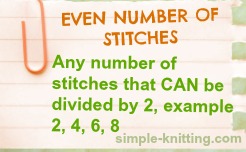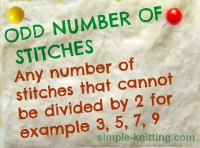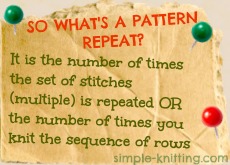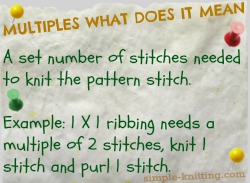- Home
- Knitting Stitch Patterns
- Reading Stitch Patterns
Reading Stitch Patterns and Knitting Multiples
What it Means
I love reading stitch patterns, well actually looking at them. I can spend hours flipping through the pages imagining what I could make.
When you first start reading stitch patterns they may seem a little confusing. I know I was and I want to save you some of the frustration I went through by explaining it to you.
That way you can have some fun with the knitting stitch patterns I have.
Let's Get Started Reading Stitch Patterns
Some stitch patterns are easy enough to understand.

They may say to work the stitch pattern over an even or odd number of stitches.
Simple enough, even numbers will be numbers that divide by 2 like 2, 4, 6, 8 and so on.
And then theres the odd numbers,

Odd numbers will be numbers that cannot be divided by 2 like 3, 5, 7, 9. Simple right?
Knitting Multiples? What Does It Mean?
While some may be one row in length, there are stitch patterns that involve a few rows or even lots of rows.
What that means is that a set number of stitches (multiple) is used to create the pattern and it may take a few rows or lots of rows to create it.
When you're reading stitch patterns it may look something like this:
Work on a multiple of 4 stitches over 4 rows
This means that when you cast on your stitches you will cast on in multiples of 4; that is 4, 8, 12, 16, 20 and so on. That's what the multiple is.
What about the rows? Each row will involve the set of stitches (the multiple) but the stitches may be worked a little differently in order to create the pattern.
Are you with me so far?
Let's keep going,
Reading Stitch Patterns - What Does the Plus (+) Mean?

Say you've been reading stitch patterns that say something like: Pattern is worked over multiple of 4 sts plus 1 OR Worked over a multiple of 4 sts + 1
This just means that extra stitches are needed to keep everything balanced (symmetrical) but the extra stitches are not part of the actual stitch pattern.
Most times the extra stitches are done at the beginning and/or the end of the row and lots of times they help form the selvage.
How to Calculate the Multiples and Extra Stitches
Now the tricky part to understand is when you calculate the multiples and the extra stitches (the + 1, 2, 3 or whatever number of stitches) you only need to add the extra stitches once.
I always got confused here so let me show you.
You're reading stitch patterns and one of the patterns says to cast on a multiple of 4 sts + 1. What you'll do is cast on the multiple of 4 so 4, 8, 12, 16 or the number of stitches you need in multiples of 4.
Then and only then will you add the extra stitches. The extra stitches are only included after all the multiples are cast on. Just once.
In the case of 4 sts + 1 it would be 5, 9, 13, 17 and so on. If you have really big numbers it's still worked the same way.
Say it's a multiple of 12 sts + 7. What you'll do is cast on the multiple of 12 so 12, 24, 36, 48, 60 whichever number in the multiple you need.
Then add the 7 extra stitches once only so the total stitches to cast on will be 19, 31, 43, 55, 67.
So What Exactly is a Pattern Repeat?
Let's continue working with the multiple of 4 stitches + 1 for the pattern repeat.

Say you cast on 17 stitches (the multiple of 4 = 16 sts + 1 extra). You'll probably knit the 1st stitch and then knit in multiples of 4 stitches all the way across your needle.
You're repeating the stitch pattern of '4' stitches all the way across your needle. That's the pattern repeat.
It may look something like this if you are reading a knitting pattern.
K1, *P3, K1, repeat from * to end of row.
The pattern repeat is P3, K1 (the multiple of 4 sts) all the way across your needle and the extra stitch is the K1 at the beginning.
Another Pattern Variation May Look Like This
K1, (P3, K1) 3 times. It means the same thing. You'll knit 1 stitch and then work what's in the brackets 3 times across your row. You're knitting the pattern repeat which is the multiple of 4 sts.
Once again the extra stitches (no matter how many there may be) are not part of the actual stitch pattern.
They're simply there to keep the pattern balanced or symmetrical. And they're only added one time once you've calculated the multiples.
Reading stitch patterns took me a while to understand and I'll tell ya, it was so frustrating and I didn't have anyone to help me with it.
I really hope I've made it easier for you to understand. And if you still need help, I'm just a click away.
Just scroll on down to the Contact Me button below on the right and click it. Send me an email and I'll be happy to help you with your questions.
Happy Knitting!


